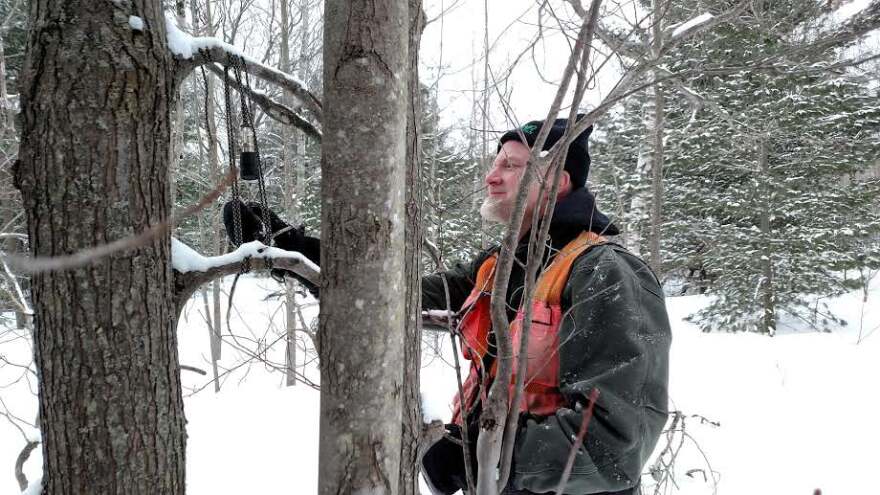Coyotes have an unmistakable howl that you’ll be hearing more and more as the weather warms up. They might have been quiet during the winter, but they weren’t hibernating. They can survive even a polar vortex.
Domestic dogs share DNA with coyotes. That inspired Cheryl Bartz of Red Pine Radio to investigate whether dogs could also make it through a winter outside.
My dog is named Rob Roy MacGregor. As you might guess from his name, he’s a Scottish terrier. Even though he looks very different from a coyote, they share genetic roots. I wondered whether enough wild DNA remained in Robby and other domestic dogs to carry them through a winter without human help.
Steve Griffith, wildlife habitat biologist with the Michigan Department of Natural Resources, says coyotes have different ways to survive the snow and cold. Last month I took a walk with him in a state forest south of Traverse City.
“We are right by the fairgrounds here on Blair Town Hall Road,” says Griffith. “This is one of our snowmobile trails, which heads south towards the Weidenhamer Swamp."
Although coyotes are well adapted to winter, they face many challenges.
“I think that staying warm is certainly the number one consideration and that takes calories,” says Griffith.
He says coyotes meet their caloric needs by hunting throughout the winter.
“A lot of times in the spring you’ll see when the snow melts, it looks like trenches, little bitty trenches like where a garden hose had laid, but that’s where mice and other small rodents have been moving,” Griffith says. “And coyotes will listen and pounce through the snow. Fox will do that as well.”
Griffith says dogs have the instinct to hunt, but they aren’t going to be as proficient as an animal raised in the wild. He says it boils down to the more you practice it, the better you are.

It’s 16 degrees out and the headwind is bitter cold.
Coyotes can withstand it thanks in part to a very thick winter coat, which traps a lot of dead air.
“That air is what’s helping insulate them from the environment,” Griffith says. “A lot of domestic dog breeds, even in the winter, if you look at their stomach, in their ears, there’s bare skin, but with coyotes and fox, their whole body’s covered with fur."
Griffith says coyotes can deal with snow balls and ice balls.
“[Coyotes are] cleaning their fur, nibbling the balls of ice off their pads or off the hair between the pads of their feet,” says Griffith.
The day is so cold that retreating to a den seems like a logical option for humans and coyotes, but Griffith says that they only den up when they’re about to have pups in the spring. During the rest of the year, coyotes like to rest where they have a good sense of the surrounding area.
“They might rest on or bed down on the top of a brush pile or, you know, a hill or something like that so they can observe and hear and hopefully smell, any potential threats or prey that are approaching them,” says Griffith.
Griffith says dogs might not do as well at finding shelter in an unfamiliar place.
“The inefficient or the inexperienced usually don’t last to pass on the genes,” Griffith says. “So yeah, I’d give the advantage to the coyote, for sure.”
Coyote survive on their own. Dogs, on the other hand, have been bred to be dependent on humans. That’s why we can get along with them in our homes. I don’t think my dog Robby would last even one night in a polar vortex.
Red Pine Radio is a group of community members who are learning to make their own radio stories. This community workshop is sponsored by Interlochen Public Radio.
If you're interested in learning more about Red Pine Radio, please contact redpineradio@interlochen.org.

